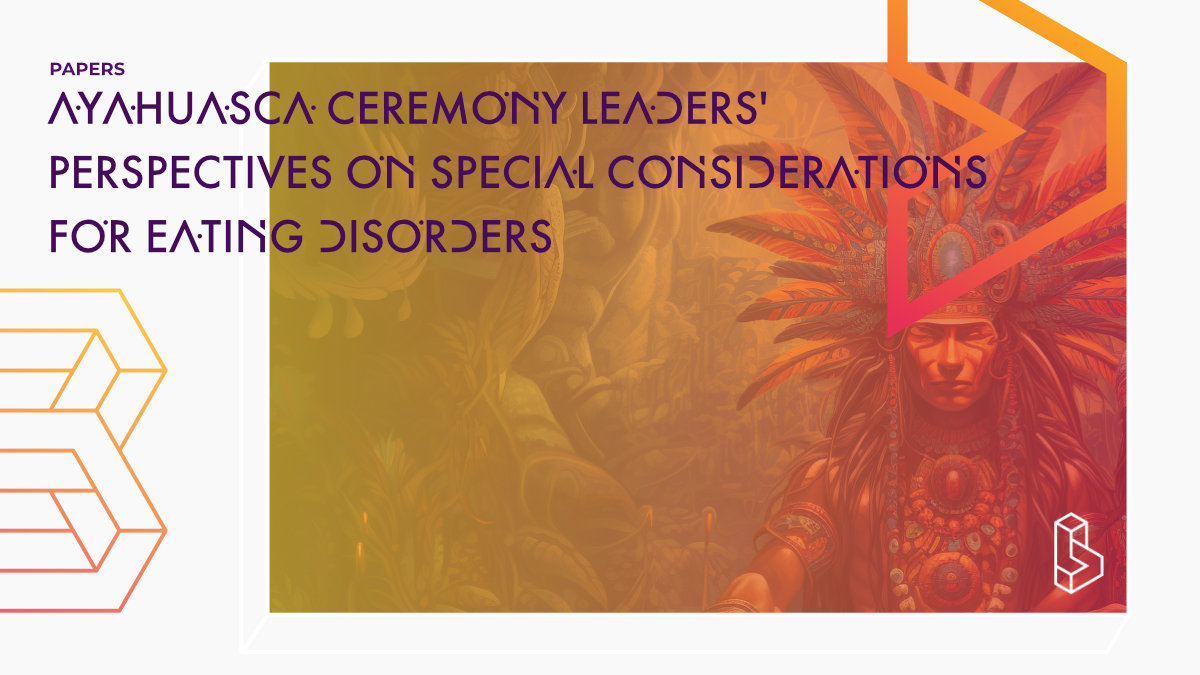This qualitative study (n=15) explores the perspectives of ayahuasca ceremony leaders, primarily from the West/Global North, on the suitability of ceremonial ayahuasca use for individuals with eating disorders (EDs). The analysis identifies categories such as screening for EDs, purging and dietary restrictions, potential risks, and complementarity with conventional ED treatment. The findings suggest the need for careful screening and extra support to ensure safe and beneficial ayahuasca ceremony experiences for individuals with EDs.
Abstract of Ayahuasca ceremony leaders’ perspectives on special considerations for eating disorders
“Eating disorders (EDs) are difficult conditions to resolve, necessitating novel treatments. Ayahuasca, a psychedelic plant medicine originating in Indigenous Amazonian communities, is being investigated. Aspects of ceremonial ayahuasca use (purging, dietary restrictions) appear similar to ED behaviors, raising questions about ayahuasca’s suitability as an intervention for individuals with EDs. This study explored the perspectives of ayahuasca ceremony leaders on these and other considerations for ceremonial ayahuasca drinking among individuals with EDs. A qualitative content analysis of interviews was undertaken with 15 ayahuasca ceremony leaders, the majority of whom were from the West/Global North. Screening for EDs, purging and dietary restrictions, potential risks and dangers, and complementarity with conventional ED treatment emerged as categories. The findings offer ideas, including careful screening and extra support, to promote safe and beneficial ceremony experiences for ceremony participants with EDs. More research is needed to clarify the impacts of ceremony-related purging and preparatory diets. To evolve conventional models of treatment, the ED field could consider Indigenous approaches to mental health whereby ayahuasca ceremony leaders and ED researchers and clinicians collaborate in a decolonizing, bidirectional bridging process between Western and Indigenous paradigms of healing.”
Authors: Meris Williams, Annie Kingston Miller & Adele Lafrance
Summary of Ayahuasca ceremony leaders’ perspectives on special considerations for eating disorders
Eating disorders are complex, often chronic, and difficult to treat conditions. Psychedelic therapies have recently been identified as one possible avenue for novel ED treatments, with multiple clinical trials underway assessing the safety, acceptability, and efficacy of treating anorexia nervosa with psilocybin and post-traumatic stress disorder symptoms with MDMA.
Ayahuasca is a decoction made from the leaves of Psychotria viridis and Banisteriopsis caapi, which contains MAOIs. It causes psychedelic effects such as illusions, altered self-reference, hallucinatory imagery, and audiovisual synesthesia.
Ayahuasca is consumed in a group setting at night, guided by one or more ayahuasca ceremony leaders and with the assistance of support staff. The effects of the brew can last for several hours.
Find this paper
Ayahuasca ceremony leaders' perspectives on special considerations for eating disorders
https://doi.org/10.1080/10640266.2023.2271201
Paywall | Google Scholar | Backup | 🕊
Cite this paper (APA)
Williams, M., Kingston Miller, A., & Lafrance, A. (2023). Ayahuasca ceremony leaders’ perspectives on special considerations for eating disorders. Eating Disorders, 1-20.
Study details
Compounds studied
Ayahuasca
Topics studied
Eating Disorders
Study characteristics
Interviews
Qualitative
Participants
15
Humans
Linked Research Papers
Notable research papers that build on or are influenced by this paper
An exploratory study of experiences with conventional eating disorder treatment and ceremonial ayahuasca for the healing of eating disordersThis interview study (n=13) suggests that ayahuasca could be an effective therapeutic tool for eating disorders (EDs). The themes identified were 1) rapid reduction in ED thoughts and symptoms, 2) healing at the perceived root cause, 3) help process painful feelings and memories, 4) greater self-love and self-acceptance, and 5) activated spiritual elements of healing.

